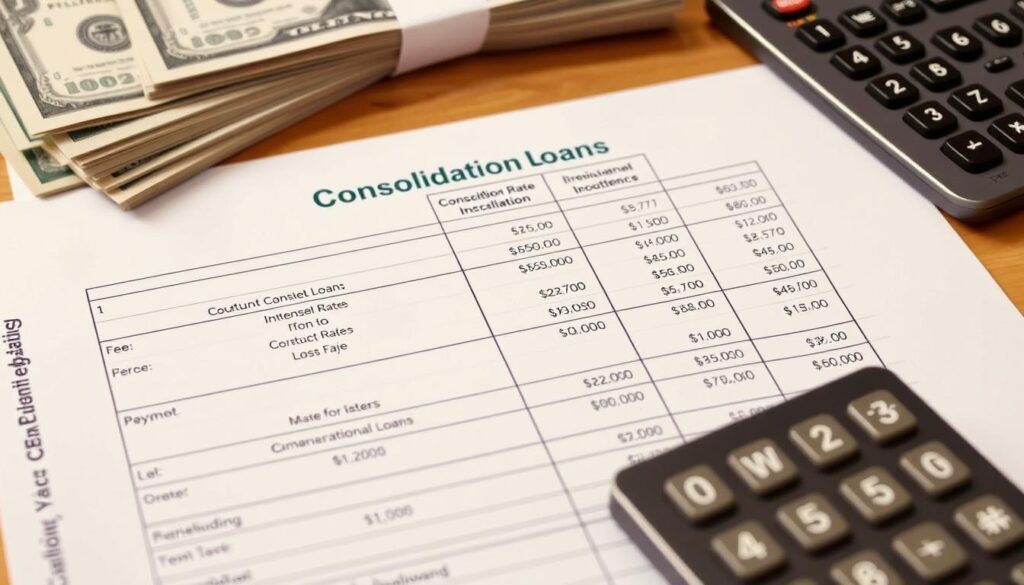Consolidation Loans: Simplify Your Debt
Did you know that nearly 80% of American households have debt? Many people are using consolidation loans to manage their finances better. This method combines all your debts into one, making payments easier and possibly lowering your interest rates. For example, putting together high-interest credit card debts into one loan can help a lot.
We’ll cover what consolidation loans are, how they operate, their advantages, and who should think about using them. This information will help us manage our debts better.
Key Takeaways
- Consolidation loans merge multiple debts into one manageable payment.
- They can potentially lower interest rates, leading to faster debt repayment.
- A significant portion of American households face debt challenges.
- This financial strategy can simplify your monthly budgeting process.
- Understanding the different types of consolidation loans is essential for making informed decisions.
What Are Consolidation Loans?
It’s crucial to know what consolidation loans are. They help manage debt better. By combining multiple debts, they simplify payments and may reduce interest rates. This makes managing money easier with one payment.
Definition and Overview
A consolidation loan combines several debts into one. This helps to simplify budgeting and monthly payments. With fixed interest rates, payments stay consistent. This makes it easier to handle than multiple debts with varying payments.
Types of Consolidation Loans
There are different consolidation loan types, each for specific situations:
- Personal Loan Consolidation: This uses a personal loan to pay off high-interest debts, like credit cards.
- Student Loan Consolidation: It combines federal and private student loans into one loan. This can lower monthly payments.
- Home Equity Loans: By using home equity, we can get lower interest rates to consolidate debts.
- Home Equity Lines of Credit (HELOC): This gives a credit line based on home equity, offering flexible debt management.
Knowing these consolidation loan types helps us choose the best one for our needs. Each option has unique advantages for financial stability.
How Consolidation Loans Work
Learning about consolidation loans helps us make smart money choices. The first step is to pick the debts you want to combine. After being approved for a consolidation loan, it pays off these debts. This gives us one loan, making it easier to manage our money each month.
The Process of Consolidation
The steps to consolidate loans include:
- Assess our current debts and determine which ones to consolidate.
- Research different lenders to find favorable loan terms.
- Complete the application for the consolidation loan.
- Upon approval, use the loan amount to pay off the selected debts.
- Commit to a new repayment schedule for our consolidated loan.
Key Features You Should Know
It’s important to know what makes consolidation loans special:
- Set repayment terms typically range from 12 to 84 months.
- Many loans offer competitive fixed interest rates, providing better predictability in monthly payments.
- Most reputable lenders operate without hidden fees, ensuring transparency throughout the process.
- Temporary impacts on credit scores may occur when applying for a new loan, but responsible payment practices can increase our scores over time.
- Some financial institutions may offer relationship discounts, allowing potential savings for account holders.
Understanding consolidation loans can lead to better financial management. It simplifies paying off debt.
Benefits of Consolidation Loans
Getting to know consolidation loans helps us make smart money choices. Combining our debts into one makes payments simpler. Also, we might get to pay less interest. It makes planning our budget easier and helps us manage our money better.
Streamlined Payments and Lower Interest Rates
Consolidation loans make our lives simpler. We switch from many payments to just one every month. This one payment can have a lower interest rate than all our other high-interest debts. So, we end up paying less overall, which frees up money for other financial goals.
Improved Credit Score Potential
Consolidating debts can also help raise our credit scores over time. It lowers our credit use rate, which is key for a good credit score. Paying the new loan on time helps build a strong repayment record. This can boost our credit score. Using tools like consolidation calculators shows us how much we can save and improves our finance health.
Who Should Consider Consolidation Loans?
Figuring out who gains from consolidation loans is key for folks looking at their money choices. These loans fit well for anyone dealing with several debts at high interest, like credit card or personal loans. To see if you’re good for a consolidation loan, check your income, credit score, and debt compared to income.
Criteria for Eligibility
Who gets a consolidation loan depends on a few things. Lenders typically check for:
- Stable income that shows you can pay back the loan.
- A credit score that’s good, often over 620.
- Debt-to-income ratio that’s low, preferably under 43%.
If you match these points, you’re more likely to get the thumbs up. This makes it smoother to bundle your debts.
Ideal Candidates for Consolidation
People best suited for loan consolidation share traits that make paying back easier. They usually:
- Have a regular income from work or their own business.
- Want to make handling their monthly bills simpler.
- Hope to cut down the interest rates on what they owe.
If your debts are more than half your income, it might be smart to look at other options besides consolidation.
Comparing Different Types of Consolidation Loans
As we look into consolidation loans, it’s key to see how they differ. By comparing them thoughtfully, we can find what fits our money needs best. This includes looking into both personal and student loan consolidations.
Personal Loans vs. Credit Card Consolidation
Comparing personal loans to credit card consolidation shows big differences. Personal loans can give us a bigger amount to pay off many debts at once. This makes repaying simpler and might offer lower interest rates. On the flip side, credit card consolidation means moving high-interest card debts to one with better terms.
Federal vs. Private Student Loan Consolidation
Understanding federal versus private student loan consolidation is crucial for education financing. Federal consolidation lets borrowers merge various federal loans into one, making payments easier and possibly extending payback times. Private consolidation, however, involves dealing with commercial lenders. They offer different rates and terms that require careful thought.
How to Apply for a Consolidation Loan
Applying for a consolidation loan needs thought and action. We’ll make it simpler by breaking it down into steps. This way, we’re ready and know what’s needed. Knowing what documents are necessary helps us succeed.
Steps to Follow
- Assess your current financial situation and outstanding debts.
- Research various loan options that best fit our needs and preferences.
- Pre-qualify for loans to gauge potential eligibility without affecting our credit scores.
- Compare interest rates and terms from different lenders.
- Finalize our chosen lender and submit a detailed application.
Documents Required
For a consolidation loan application, we need a few key documents. These usually include:
- Proof of income, such as pay stubs or tax returns.
- A comprehensive credit history to show how reliable we are.
- An overview of existing debts, including how much we owe and to whom.

Common Misconceptions About Consolidation Loans
It’s important to know the truth about consolidation loans before you decide. Many believe in misconceptions about consolidation loans that can lead to bad choices. Let’s clear up these myths and look into the possible downsides.
Debunking Myths
One big myth is that debt consolidation will instantly boost credit scores. While it can help in the long run, your score might dip at first. Consolidation makes payment easier but doesn’t wipe out what you owe. This confusion makes some think their money troubles are gone, but really, they’ve just changed the form of their debt.
Understanding Risks and Limitations
We need to understand the risks of consolidation loans too. It’s easy to overlook hidden costs or longer payback times, which can make you pay more in the long run. Without a thorough look at these issues, you could end up worse off financially. Staying informed helps us handle our debts better. For deeper insights on busting debt consolidation myths, check out more here.
Costs Associated with Consolidation Loans
It’s key to know the costs of consolidation loans for smart money choices. These loans can lower our monthly bills and simplify our finances. Yet, fees and interest rates could affect our total savings.
Fees and Interest Rates
Getting a consolidation loan means looking at different fees. For example, we may face origination fees for processing our loan application. There could be prepayment penalties too, if we pay off the loan early. Interest rates vary widely based on our credit, from 6% to 36%. So, it’s vital to look at all costs, not just the upfront ones.
Hidden Costs to Watch Out For
When trying to reduce our debt, we need to watch for hidden costs. Unexpected fees like administrative charges can surprise us, and some loans have extra fees that increase our costs. By keeping an eye on these, we can better understand the full impact of consolidating our debt.

Strategies for Successful Debt Consolidation
After getting a consolidation loan, it’s key to manage our debt wisely. A strong plan helps us stay on financial track. It means prioritizing monthly payments and cutting unnecessary spending. Let’s briefly cover some main points, like making a budget that fits our new financial picture.
Creating a Realistic Budget
It’s vital to create a budget for our loan payments. This budget must account for our real monthly costs and the debt we’re tackling. A good budget helps us pay off debt and take care of basic needs. Budgeting apps are handy, showing us how we spend and where we can save.
Setting Financial Goals
Setting clear financial goals improves our debt handling. These goals keep us motivated and on the path to financial freedom. They let us track how well we’re doing and keep our eyes on the prize. Mixing short-term and long-term goals works best. Writing down our goals makes us more committed to reaching them.
| Goal Type | Description | Time Frame | Example |
|---|---|---|---|
| Short-Term Goals | Immediate targets that lead to progress | 1-6 months | Reduce credit card debt by 20% |
| Medium-Term Goals | Goals that require more time but are achievable | 6 months – 2 years | Consolidate all high-interest debts |
| Long-Term Goals | Ultimate target for financial health | 2 years or more | Achieve complete debt freedom |
Mixing good consolidation strategies with a solid budget and clear goals helps us secure our financial future.
When to Reconsider Consolidation Loans
It’s crucial to know when it’s time to rethink our consolidation loan choices for sound financial health. Signs may show up suggesting it’s time to look for other ways to manage our debts.
Signs Consolidation May Not Be Right
Sometimes, our debts might be more than half our income. This is a big warning sign. At this point, talking to creditors or starting a debt management program could be better. If we’re struggling to stick to a repayment plan, it might mean consolidation isn’t the best fit right now.
Alternatives to Debt Consolidation
There are other ways to handle our finances better. Let’s look at a few:
- Debt Management Plans: These plans can help us negotiate lower payments and better terms with creditors.
- Credit Counseling Services: Certified pros can offer us tailored strategies for managing our debts.
- Debt Settlement: This means negotiating a payment that’s smaller than what we owe.
Exploring these options can lead us to smarter choices regarding our financial future instead of just sticking to consolidation loans.
Closing Thoughts on Consolidation Loans
When we think about consolidation loans, we see they have a lot of benefits for people with many debts. By looking carefully at our own financial situations, we can decide if consolidation is the right move. It’s important to look at everything, like interest rates and if we qualify, to make sure it helps us in the end.
Final Considerations
Getting to financial stability means really understanding consolidation loans. These loans can make paying back what we owe simpler and might even lower what we pay in interest. But, it’s just as key to know about any risks. Thinking about our personal situations helps us make good choices. As we look at our options, finding more information on debt consolidation can also help a lot.
Resources for Further Information
If you want to get better at managing your money, there are great resources out there. Things like credit counseling, financial planning sites, and tools for reducing debt can really help. These resources give us a better view of our money, helping us make choices that fit our goals. In short, using the right tools is key to reaching our financial dreams.









